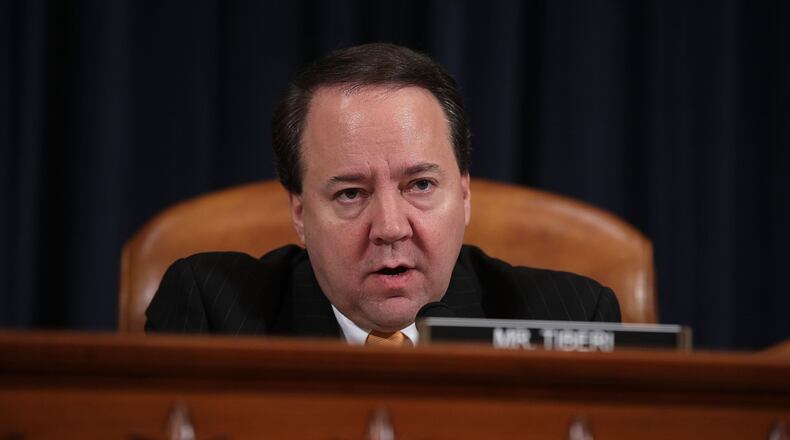“The reality here is that there is an enormous focus On this tax bill on how it will treat and benefit corporations and other business interests,” said Fred Wertheimer of the watchdog group Democracy 21. He said Tiberi “is a lame-duck member of Congress. He has made the decision to leave Congress and go out and function in the private sector…He should not be reaching decisions that would benefit (the Roundtable) at the expense of all taxpayers.”
Steven Spaulding of Common Cause also called on Tiberi to recuse himself from the issue.
“If he’s accepted a job, in my view, he should not have a pen anywhere near tax legislation in particular,” Spaulding said. “It’s a clear conflict of interest if he’s going to continue to drive the bus on tax reform.”
No law calls on Tiberi to remove himself, although House ethics rules “strongly encourage” members to abstain from voting on legislation that “provides a benefit targeted to any entity with which the Member is negotiating or from which the Member has accepted future employment.”
There is language addressing a conflict of interest or “an appearance of a conflict of interest.” According to an attorney whose law firm represents clients on congressional ethics laws, among other issues, the benefits referred to in the law are typically seen as being tangible, such as an earmark or a “very specific financial holding.”
“I see it as very straightforward,” said Eliot Berke, managing partner of Berke Farah. “I don’t see the need for him to recuse himself. I’m confident if asked, the Ethics Committee would tell him the same thing.”
A Tiberi spokeswoman said the congressman has worked closely with the House Ethics Committee to make sure he does not violate House ethics rules. Tiberi does not plan to recuse himself from tax reform.
Under House rules, Tiberi is required to disclose any employment negotiations within three days of beginning them. He did that, his staff says, disclosing negotiations with the House Ethics Committee on Oct. 17.
Lobbying disclosure forms on the House database indicate that the Ohio Business Roundtable itself only lobbied on one issue in 2016 and 2017: One that would put high-quality principals in low-income schools.
But watchdogs say they are more concerned about the tax agendas of the businessmen and women on the board than they are the overarching issues of the Roundtable. Among those on the board are Gary Heminger, chairman of Marathon Petroleum Corp.; Christopher Connor, chairman of the board of the Sherwin-Williams Company; and Scott Farmer, CEO of Cintas.
Tiberi’s defenders argue there’s no reason for him to recuse himself: They argue that everyone — including members of Congress — pays taxes, and are thus affected by the tax bill.
“Tax reform has a potential benefit for all Ohio businesses and industries, regardless if they are a member of the Roundtable,” said Tiberi’s spokeswoman, Olivia Hnat.
Watchdogs dismiss that defense.
“Everyone doesn’t pay corporate taxes,” said Wertheimer. “I don’t.”
Craig Holman of Public Citizen, another watchdog group, said tax law can be very specific, affecting certain industries or businesses.
“A little favoritism in the tax law can go a long way toward feathering the bed of both the Roundtable and its future president,” he said.
But Holman said it’s unlikely the House Ethics Committee will take any action against Tiberi. Lawmakers are encouraged to “self-recuse,” when a conflict presents itself, he said, but are not required to step away.
“The bottom line is there are very few ethical requirements imposed upon this person,” he said. “He can get away with almost everything.”
About the Author
